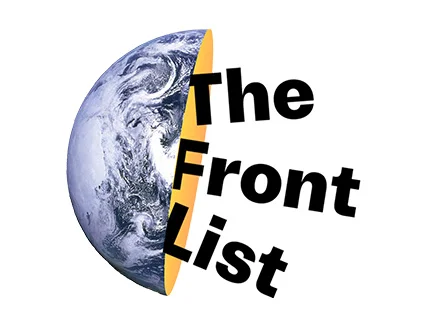Hilsum had stepped in to replace the historian and author Anne Applebaum, who had to withdraw due to ill health. In her opening remarks, the director of the Book Festival Jenny Niven informed the audience that Applebaum “was in good hands, getting good treatment”. Niven thanked Hilsum for “stepping into the breach” at short notice (so short that there were no copies of Hilsum’s book to be signed).

A very good substitute
Both speakers had extensive experience of reporting on conflicts, and of commentating on world events. Acclaimed journalist Lindsey Hilsum is best known as International Editor for Channel 4 News. Her books include In Extremis: The Life and Death of the War Correspondent Marie Colvin and, more recently, I Brought the War with Me: Stories and Poems from the Front Line. Wong is Diplomatic Correspondent for the New York Times, focuusing particularly on American foreign policy and its impact. He’s the author of At the Edge of Empire.
Both have reported from countries undergoing turmoil, such as Iraq, Rwanda and Ukraine. Wong also brought to the discussion and in-depth understanding of China, which he had explored in relation to his parents. Hilsum apologized “for not being an Anne Applebaum”, but was able to bring plenty to the discussion. A very good substitute.
The conversation was chaired by the investigative journalist James West, executive editor of Mother Jones, the American progressive magazine. The dialogue between the three was engaging and well-informed, with a large degree of consensus between the speakers, though not total unanimity on all themes.
USA – WTF
West began by summarizing the introduction he had prepared as simply “USA – WTF”. The changing character of the United States and its role within the international order was the dominant theme of the discussion, with the figure of Trump looming over every topic.
They began by looking at the recent meeting in Alaska between Putin and Trump. Hilsum felt that Trump had “bought Putin’s line”, that the “root cause” of the conflict was not Russia’s invasion. In short, tacit acceptance of Putin’s narrative that Ukraine isn’t really a proper country, but just “a little Russia, populated by little Russians”. In recent trips to Ukraine, she had sensed optimism declining, with many “fearing betrayal” by Trump.
Wong felt that, in the main, Trump was a fairly “transparent” figure who generally means what he says. This included his undoubted admiration for some autocrats, and a desire to join that club as they decided the fate of the world. Wong felt that Trump’s anti-China rhetoric should be taken with a pinch of salt and that, at root, he was prepared to be “transactional” with Xi Jinping. This was what lay behind Trump’s turning his back on the international institutions that grew out of World War Two.
In their discussion of Gaza, the speakers felt that the US was no longer performing its role of acting as a controlling influence on the Israeli government. There was, according to Wong, little sense of the USA “reigning in Israel”. Wong outlined that foreign policy in the US was being controlled by a very tight circle, “almost like a medieval court”, with loyalty and ideological purity valued over all else. In contrast to the first Trump term, there were fewer moderate voices being heard by the President.
More generally, there was a sense of a return to the dominance of great powers with separate ‘spheres of interest’. Hilsum talked of parallels with the Yalta conference at the end of the Second World War, in which Europe was divided up. There was some sense of a return to some elements of the imperial era, but “in a post imperial World”. This disjuncture lay behind much of the international tension at present, with the old world order breaking up but a new one yet to be established.
Sucking attention
Both Hilsum and Wong have spent a lot of time covering genocides, this was another major theme of the discussion. There was a sense for both that some major crises, such as in Sudan, were not getting the attention they deserved. This was partly because “Trump sucks attention”.
Though Applebaum was not present, one of her major themes (as outlined in books such as The Twilight of Democracy) was covered. This was, Wong outlined, the sense that we are seeing, in established democracies, elements of “escalating authoritarianism” or, at the very least, some ‘backsliding’. There was plenty of evidence of “erosion of norms” and people in various sectors “bowing down to threats”. There were, in the US, signs of governmental power eroding institutions which normally kept the state in check.
Ideological purity
However, Wong was quick to add that the US is still some distance away from properly authoritarian States such as Russia or China, where the entire system was dominated by the government, building on many decades of authoritarianism.
What particularly worried Wong here was increasing evidence of an increasingly ideological aspect to the United States. He cited examples of “party cells” embedded within key institutions trying to make sure that they operated in accord with Trumpian values. This raised the question of how resilient the US was and also what role the media and journalism could play. Is the media capable of keeping Trump in check?
Hilsum felt that the teaching of “media literacy” was greatly needed. As she noted, people are increasingly getting their news from very different sources, not the large established media organizations which dominated until fairly recently. She was aware that the media organisations she and Wong were most associated with (Channel 4 and the New York Times), were no longer as influential as they once were. As the media environment evolved, how can good quality, verified news and comment be maintained?
For Hilsum, being able to distinguish between high quality news and comment and material filled with conspiracy theories was critical in maintaining healthy democracies. She was aware that she was speaking to an audience who had grown up on the BBC and serious newspapers, but this was changing. Younger generations were consuming media differently, she noted. She paused and looked around at the rather ‘mature’ audience, asking rhetorically “if there is anyone under 30 here”. There was an “atomisation of information”, with many only consuming media by those they shared an ideological viewpoint with. This was all adding to polarised politics.
In awe
They ended by looking at the role played by journalists on the ground in conflict zones, with reference to the recent deaths of Al Jazeera journalists in Gaza. Hilsum was “in awe” of the Gazan journalists still working there. She and Wong noted that those most in danger were local journalists, who were often considered fair game by combatants. Marie Colvin, who was killed in Syria, was an exception to this. Wong talked movingly about the local teams he had worked alongside in Iraq.
Pretty gloomy
The questions from the audience were sharp and succinct. That’s not always the case at Book Festival events, when there’s a tendency for audience members to make mini speeches and not ask actual questions. The final questioner noted that the conversation had been “pretty gloomy”, so asked whether there were things the panellists felt optimistic about.
Hilsum felt that while the withdrawal of some international aid agencies from parts of Africa was regrettable, she did feel that it was helping countries move away from a “patronising idea of aid”. Instead, things were being organised by those from the countries affected, not western saviours.
Wong felt that despite the drift to authoritarianism (including in countries such as Hungary and the US), “the brand of democracy” was “still strong”. Most countries wanted to be part of the democratic club, even if they often paid lip service to some aspects of it.
Hilsum ended by praising the “intellectual and creative ferment” in Edinburgh in August. That for her, was a reason to be hopeful. Praising the audience is always likel to go down well!
Like Loading…
Related
